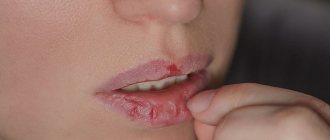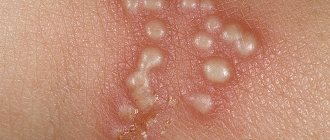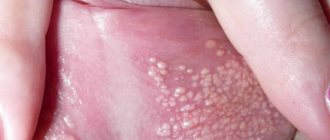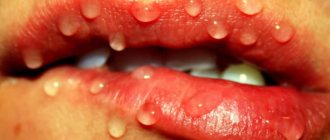Herpes on the lips (lat. Herpes labialis, in everyday life the names cold sores or fever on the lips are sometimes used) is a consequence of infection with a certain type of herpes virus. This disease is one of the common infectious diseases of the skin and mucous membranes, which is easily transmitted between people.
There are 8 known types of herpes simplex virus, and each type predominantly causes herpetic lesions of a certain type. Herpes on the lips is initiated by infection with the herpes simplex virus type 1, much less commonly with type 2. The type 1 virus can also cause other diseases, for example herpetic stomatitis, herpetic keratoconjunctivitis.
How does primary infection occur?
Often, the initial infection with a herpes infection has no symptoms and is not noticeable. But it happens that complications appear along with herpes:
- gingivostomatitis - inflammation of the oral mucosa and gums;
- an increase in temperature, accompanied by the appearance of blisters and ulcers in the mouth;
- herpetic panaritium (inflammation of the finger tissue) - the infection can spread to the fingers if they are pulled into the mouth;
- rashes can occur throughout the oral cavity, affecting the gums, which turn red and bleed. The child refuses to eat because the process becomes painful.
Treatment methods
There are several ways to get rid of cancer. When choosing a tactic, pay attention to the presence of complications, as well as the stage of the disease.
At the initial stage of cancer development, tumor removal and drug treatment are combined.
Medicines
At the initial stage of development of the disease, the use of medications is permissible. But more often they resort to an integrated approach. If the cancer is at stage 1, then it is recommended to remove the tumor, along with the tissues surrounding the formation.
As a rule, drug treatment is part of combination therapy and is carried out after excision of the tumor.
Surgery
Let's consider options for surgical intervention, depending on the stage of development of the disease:
| Stage 1: | The affected tissue is excised, the structures surrounding the tumor are also removed, the excision is carried out to 1.5-3 cm. |
| Stage 2: | The focus is irradiated and the lymph nodes in the neck area are taken under control; if they continue to increase in size, then the subcervical tissue is excised. |
| Stage 3: | They practice radiation irradiation of the tumor focus, then use targeted administration of radioactive drugs, after such therapy they perform resection of the lip. |
| Stage 4: | Irradiation is carried out before and after surgery, not only the formation is removed, but also part of the cervical tissue. After surgery, irradiation is repeated. |
It is noteworthy that in this type of oncology chemotherapy is not widely used and is carried out in exceptional cases.
Folk remedies
Treatment of cancer with folk remedies is considered an extremely dubious activity. Because it doesn't bring any results. Such therapy can take time and cause serious harm to a person’s health.
Therefore, you should not cauterize the seal with iodine, vinegar, or apply a strong decoction of celandine to it - this is unlikely to stop the pathological process.
Alternative Methods
Similar methods exist and in practice they are used with varying success, they are used:
- in case of superficial lesions of organic tissue, it is permissible to administer a photosensitizing drug, after which the tumor is subjected to laser irradiation;
- The cryogenic method allows one to avoid radiation and chemotherapy; it is also used in case of tumor recurrence.
Recommended video:
https://www.youtube.com/watch?v=3sBT8g9z8qM&t=15s
How to fight a “cold”?
If herpes appears for the first time or in a baby under 6 months, and the disease is accompanied by fever and affects not only the lips, then you need to consult a pediatrician for antiviral therapy.
Often recurrent infections go away on their own. But you can shorten their duration by using local antiherpetic agents (active ingredient acyclovir).
Ways to reduce discomfort:
- apply a cold compress to the area of the rash;
- avoid sour and spicy foods;
- choose cool drinks;
- if there is severe pain, then use ibuprofen or paracetamol;
- Do not use products containing lidocaine due to possible side effects or overdose.
How to prevent the spread of the virus:
- it is important to ensure that the child does not scratch the rash and wash his hands;
- use individual dishes, towels, toothbrushes for a child with a herpes infection;
- during an exacerbation, you should not engage in contact sports;
- a child with a “cold” on his lips should not kiss other people.
Traditional medicine for swollen lips
Swelling on the lips is rarely expected; rather, it takes you by surprise. It’s good if your home medicine cabinet contains pharmaceuticals suitable for each specific case. The victim probably has the opportunity to go to both a doctor and a pharmacy. But what to do when your lip is swollen at night? It is advisable to react to damage as quickly as possible; you have to use improvised, “folk remedies”.
Traditional medicine suggests solving the problem of swollen lips as follows:
- aloe juice - finely chop or crush a large leaf of an adult aloe (over 3 years old) and squeeze out the juice, soak a cotton pad in the juice (or you can wrap the aloe pulp in gauze) and apply to the swelling for 15-20 minutes;
- a mixture of turmeric, Fuller's earth and water - the powders must be taken in equal quantities and diluted with a small amount of water to a paste-like state; apply to the swelling for 15-20 minutes, then rinse with warm running water;
- baking soda - form a paste-like substance from baking soda and a small amount of water and apply it to the damaged area of the lips; after 10 minutes, rinse with cold water;
- honey - apply a thick layer of honey onto a cotton pad, apply to the swollen area for 20 minutes, rinse with cold water; repeat several times a day.
Useful video
From this video you will learn how and with what you can quickly cure herpes:
Herpes inside the lip is more dangerous than outside. Treatment can be ineffective or very long, and it must be comprehensive.
The sooner this disease is eliminated, the less likely it is to develop serious complications.
Therefore, if you experience pain on the inside of your lips, you should definitely visit a dentist.
He specializes not only in the treatment of dental diseases, but can also recommend remedies for herpes, which manifests itself in the oral cavity.
Author of the article
ENT (otolaryngologist), 11 years of experience
What is worth knowing about the causes of the disease?
If you see a cold on your lip and find a photo of a similar disease on the Internet, then it’s worth finding out more about it. Typically, doctors divide the manifestation of herpes on the lips into 2 forms:
- Primary herpes. This means that the disease manifests itself in this person for the first time.
- Herpes is recurrent. A disease that has already made itself felt and is now reappearing.
In order to become more familiar with the disease, it is necessary to understand which of them will manifest itself when.
We recommend reading: Rf lifting: reviews
What should you know about the symptoms?
You can identify herpes diseases (photo) on the lip by searching for information on the Internet. Naturally, there are many examples of how this deviation looks and manifests itself. The doctor will be able to confirm it, as well as the results of the tests that were carried out. Such a disease can be easily identified by people who have previously suffered from it.
Let's look at what stages of herpes exist and how they will manifest themselves:
- 1 day. The stage is called prodromal. At this stage, you can observe redness of the lips, itching, tingling, and discoloration of the skin on the lips. This stage takes several days in different cases. It is advisable to begin treatment at this stage, because it is possible to reduce both the duration of the disease and its severity.
- Stages of inflammation. In most cases, it occurs on the first day immediately after the itching appears. In the affected area of the skin, the virus begins to divide and multiply, a swelling appears on the lip, and not only redness, but also swelling occurs.
- This stage appears somewhere on the second or third day. Large, hard blisters appear on the lips. They contain a clear liquid that will become cloudy. Touching damaged skin can be quite painful. It is in this place that the herpes virus accumulates; the fluid itself is very contagious.
- The next stage is characterized by the bursting of bubbles. In fact, there is one large wet sore on the lip. Often at this time the body temperature increases and the lymph nodes begin to grow.
- From 5 to 8 days, sores appear at the site of the wound. They can be brown or yellow. At this stage, the carrier is contagious, the disease is easily transmitted through liquid. The cracks may continue to ooze fluid containing herpes.
- The next step can take from 8 days to 2 weeks. During this period, new skin appears on the lips, the crusts will peel off on their own. They must be endured and not torn off, otherwise new frames may appear later. The recovery period can vary markedly, depending on the stage at which treatment of the disease began.
Simple but necessary prevention
If you want to avoid the appearance of disease on the lips, then you need to:
- Wash your hands consistently and regularly.
- Minimize direct contact with people who have herpes outbreaks.
- Use balms and creams to moisturize your lips.
- Wash towels, pillowcases and pillows after each use.
- Do not share personal belongings with a person who has herpes.
- Use sunscreens and lip balms that contain zinc oxide.
Only by following all the above recommendations can you avoid the manifestation of the disease or quickly eradicate it if it appears.
Read: How to restore eyelashes after extensions and what care do they need?
Types of drugs
The main group of tablets recommended for the effective treatment of herpes includes four nucleosides with similar effects - acyclovir, penciclovir, valacyclovir and famciclovir. An impressive part of the preparations use one of the above substances as the main component. It should be noted that components such as valacyclovir and famciclovir are not active.
Their activation begins only after they enter the digestive tract, where the transformation process occurs. Valaciclovir is converted to acyclovir, and famciclovir is converted to penciclovir. The substances affect the DNA synthesis of the replicating virus without affecting the pathogen that is in a latent state.
Based on their composition, herpes tablets can be divided not only according to the main components, but also according to their special properties.
For targeted treatment, doctors use:
- Medicines of a narrow specialization, so-called antiherpetic drugs (Acyclovir, Valtrex, Zovirax);
- Medicines related to immunomodulators (Anaferon, Galavit);
- It is possible to use interferon-containing agents, but some experts question the advisability of their use (Reaferon);
- Drugs that stimulate the body's production of its own interferon. This treatment regimen helps increase the intensity of the immune response to the virus (Arbidol, Lavomax, Cycloferon).
Antiviral
Antiviral immunostimulating agents come in a wide variety and are prescribed to support immunity. Such drugs are recommended not only for herpetic infections; there can be a great many indications for starting use.
Immunomodulators and antiviral drugs have general indications and their scope of application:
- Herpes of varying severity;
- Preventive measures and seasonal therapy of respiratory diseases;
- Fighting viral hepatitis;
- Treatment of cytomegalovirus;
- In joint therapy of multiple sclerosis, encephalitis, viral eye damage;
- Chlamydia;
- Tuberculosis.
Immunomodulators
Support of the immune system, in the case of herpetic disease, is prescribed for relapses, extensive lesions that abundantly cover the patient’s skin and mucous membrane. The most popular medication is Isoprinosine; herpes medications containing this substance are also prescribed.
Could there be complications?
Yes, they can, and it’s worth knowing about them:
- A serious complication is the manifestation of herpes in the eyes. This occurs because initially the patient may rub his lips with his hands, and then rub his eyes. In this case, infection occurs, most often the problem appears in young children. Treatment of the disease must be started immediately, because its further complication is possible. In rare cases, even complete blindness cannot be ruled out.
- The appearance of cracks in the corners of the mouth. In this case, it is necessary to resort to antifungal drugs, and not just to the treatment of herpes. The cure for the disease may take a long time.
- The virus enters the oral mucosa. Most often it occurs in children, but manifestations are often found in adults. A negative consequence is erosion of the oral mucosa, redness of the gums and cheeks.
- During illness, it is worth completely abstaining from oral sex. If this is not done, the result will be genital herpes in your partner.
Reappearance of herpes
The difficulty of treating the disease is that after its manifestation, the virus cells will reside not only in the tissues, but also in the nerve fibers. As a result, the virus spreads throughout the body, and then remains in an inactive state in the body for the rest of its life. However, as soon as a favorable moment for the development of the disease appears, the virus immediately makes itself felt. That is why more and more often photos of herpes on the lips on the Internet are a search query that interests many people. Usually, below such photographs you can find out what causes the manifestation of the disease.
The likelihood of manifestation can be minimized by eliminating factors that provoke relapse. These include:
- Contact with a person who has clinical manifestations of the disease.
- Severe hypothermia of the body.
- A noticeable weakening of the immune system, which will often be accompanied by a cold.
- Carrying out chemotherapy, hepatitis, taking steroids.
- Severe dehydration or prolonged exposure to the sun.
- Damage, abrasions and scratches appearing on the lips.
- Stress, noticeable physical fatigue of a person.
- Carrying out cosmetic and dental procedures.
- Critical days for women.
There are many actual prerequisites for the appearance of the disease, and it is impossible to completely eliminate its manifestations in the body.










